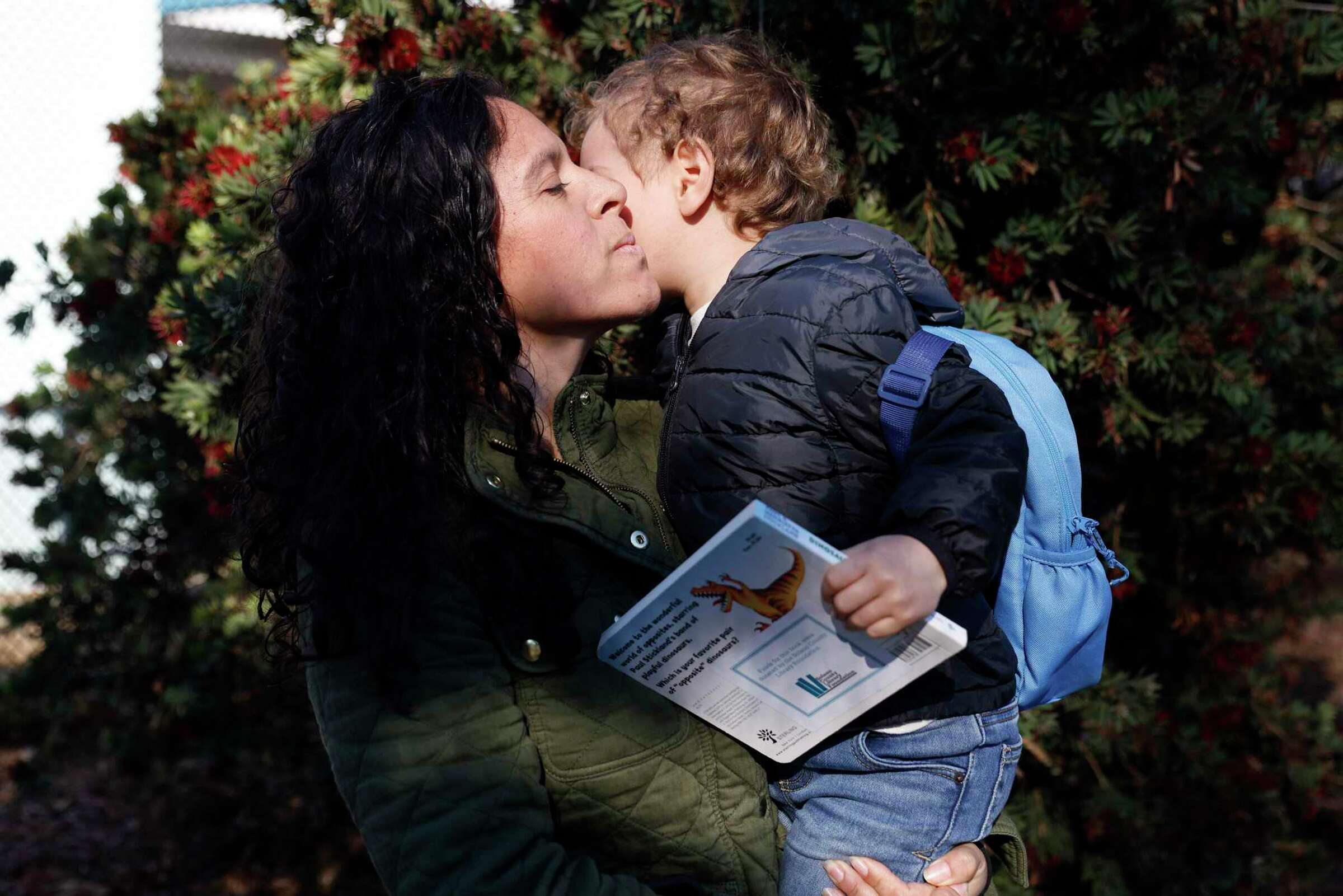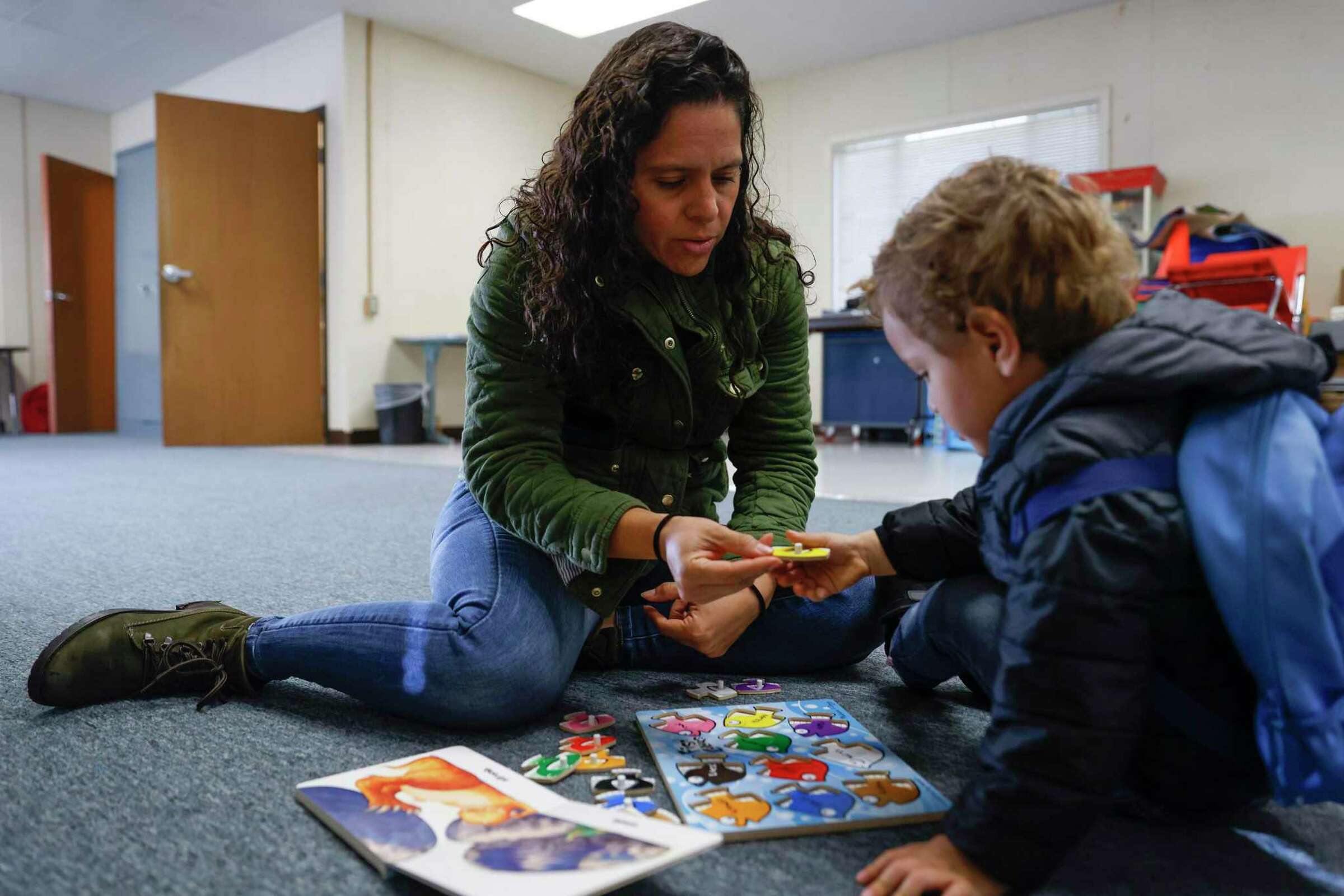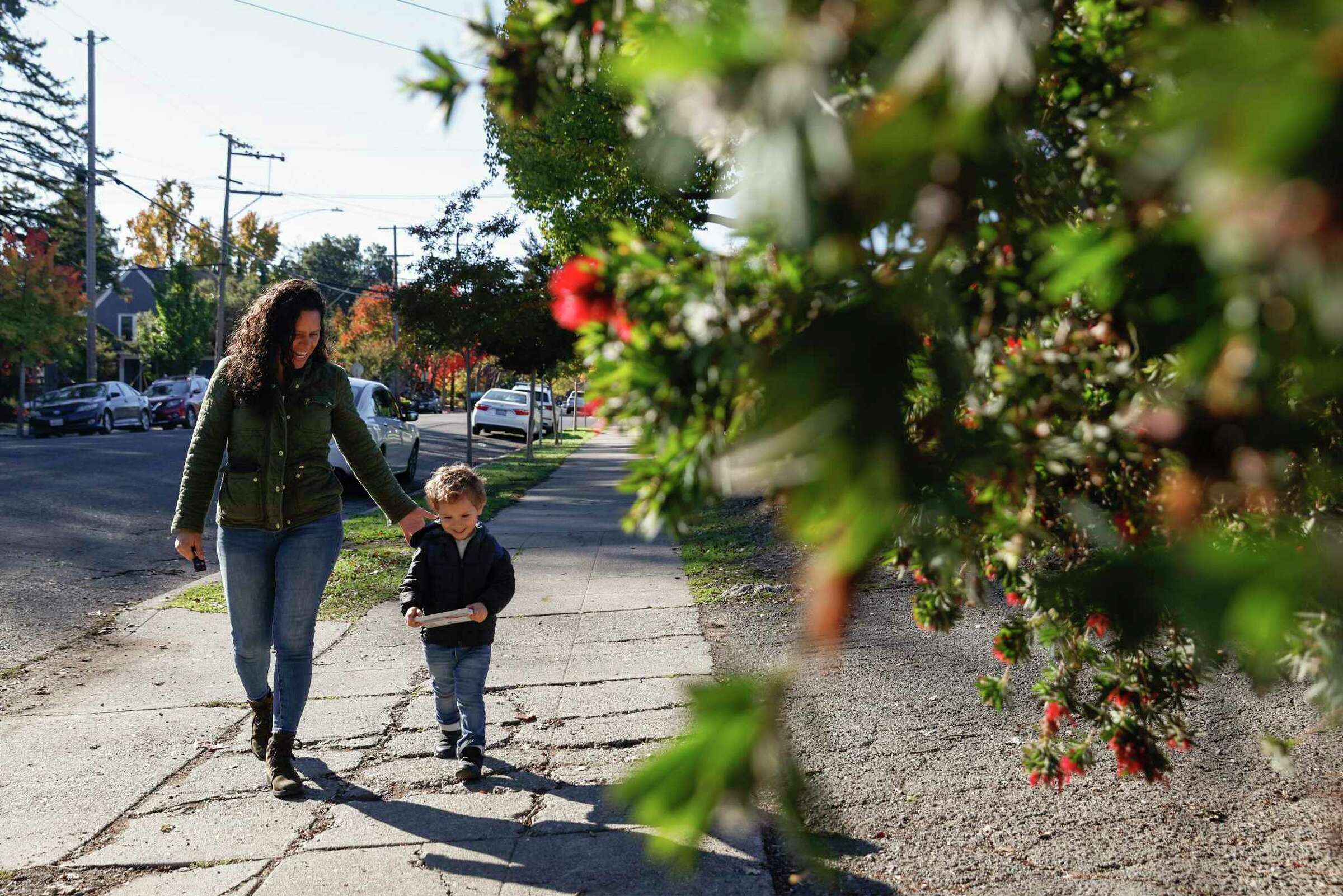
Esbeidy Berlehem Piña Alcantara’s overriding goal is “safety and tranquility for our children and ourselves.” That’s why her family decided in 2018 to leave the violence-plagued Mexican state of Guanajuato and move to Napa, where Alcantara has extended family.
It wasn’t easy — she and her husband left behind their family business in order to escape the turmoil, Alcantara said. In a rush to leave, they knew nothing of Napa before moving. They took their oldest son, then just 7 years old.
“We didn’t feel secure, even my husband walking in the street,” Alcantara said in Spanish through a translator and social worker, Ariadna Rodríguez Chacón.
Alcantara’s second son, a 2-year-old named Kenneth after his father, ran around Chacón’s office at Shearer Elementary School as Alcantara recounted the last four years, at times tearing up while remembering the family’s move to Napa. It was a hard story to tell, in small part because Kenneth kept wiggling his way onto Alcantara’s lap, stabbing papers with crayons and wielding markers like wands.
After arriving in Napa in 2018, the family moved in with a relative of Alcantara’s, she said — with husband and wife sharing a bedroom with their oldest son. As he struggled to process the violence back home in Mexico and adjust to a new country, her husband, Kenneth Manuel Anaya Espinosa, went through bouts of depression and lost about 40 pounds, Alcantara said.
That happens a lot to our community: In Mexico, some have a bachelor’s degree, some have a profession. But when you come here, you don’t have any profession
It was also difficult to adjust from being “professionals” in Guanajuato — Alcantara was a middle and high school teacher, and Espinosa was an architect and math professor — to not having a profession, Alcantara said. “That happens a lot to our community: In Mexico, some have a bachelor’s degree, some have a profession. But when you come here, you don’t have any profession,” Chacón said.
Espinosa started working at a restaurant in town. But as the family began to settle down, the pandemic began.
Espinosa lost his job as restaurants shuttered with stay-at-home orders. Alcantara, in the middle of a high-risk pregnancy carrying Kenneth, had to quit her job at a dry cleaner. Espinosa sometimes found work in grape fields, but to make ends meet, the family used up their savings, Alcantara said.


In February of this year, the family had to move again: Alcantara’s relative told the family they had to move out in less than a month, because the relative was expecting other family to move in, Alcantara said. But the family couldn’t afford on their own to find another place to live on such short notice, Alcantara said.
Alcantara said she was most distressed by the thought that her two young kids could be homeless.
“I passed through depression, anxiety because at that moment, I was worried that my kids wouldn’t have a place to live. Kenneth was very little; he was in a stroller in February,” Alcantra said in Spanish through Chacón.
Alcantara made a list of potential resources and came across The Chronicle Season of Sharing Fund, which provides financial assistance year-round to those in the Bay Area struggling to afford housing or other critical needs. All donations to the fund go directly to people in need, with administrative costs covered by The Chronicle and the Evelyn and Walter Haas, Jr. Fund.
The Alcantaras were connected with Chacón, a caseworker with the Neighborhood Initiative, a nonprofit working to aid the Latino communities in Napa through programs such as family resource centers embedded in local elementary schools. The Alcantaras became Chacón’s clients, and she helped them apply for Season of Sharing funding.
The Season of Sharing Fund helped cover the security deposit and first month’s rent for Alcantara and her family as they moved into a one-room mobile home in Napa. The landlord let them move in before the Season of Sharing funding arrived, because the landlord had leased to other people who received Season of Sharing assistance and knew the family would qualify, Alcantara said.
you can have three families living in one three-bedroom house and sharing the common areas because of the rise in rent
When she learned that her family had been approved for Season of Sharing funding, “at that moment, I had extra breath,” Alcantara said in Spanish through Chacón.
Chacón said she mainly works with Latino clients in her job with the Neighborhood Initiative. Approximately 40% of people living in the city of Napa are Hispanic or Latino, according to data from the 2020 U.S. Census.
Alcantara’s situation is not uncommon: In Napa, “you can have three families living in one three-bedroom house and sharing the common areas because of the rise in rent,” Chacón said. For much of the pandemic, eviction moratoriums and rent caps helped the families she works with stay in their homes.
But now, with many of those protections rolled back, Chacón said about 90% of her clients are in need of rental assistance. “Most of the time, we suggest moving to another county in case they have good luck finding a better place to live with lower rent,” Chacón said.
Some of the Latino families who have been pushed out of Napa by cost-of-living, however, are the ones working to prop up its world-famous wine and tourism industry, Chacón said.
“The people that are serving you at the restaurants or the people that are in the kitchen, the people that work in the field, are Hispanic or Latino people,” Chacón said.
When her clients don’t have a Social Security number, they’re “very limited” in the resources they can use, Chacón said. Part of what makes the Season of Sharing Fund valuable is that you don’t need a Social Security number to apply, Chacón said.
Alcantara said through Chacón that she’s grateful for non-profit organizations “that help families who don’t have options, and give them options and an extra hand.” In her free time, she said she volunteers with non-profits such as Puertas Abiertas that support Napa’s Latino community.
Little by little we are achieving stability, which fills me with happiness: having our own space for our family and finding people who support us
“This makes me feel united to the community and (lets me) support people like me who are going through or have gone through difficult situations,” Alcantara wrote in Spanish via email.
Two months ago, Alcantara and her family moved into a two-room mobile home in Napa owned by the same landlord. That means a rent increase, which is stressful, Alcantara said, but they’re getting to a more financially stable place. Espinosa works installing and maintaining pools and spas for 40 hours a week, Alcantara said.
Alcantara takes care of Kenneth as a stay-at-home mom and volunteers with his preschool class, where she’s found a sense of community. In the near future, Alcantara hopes to become a preschool educator to once again “practice my profession and contribute to the education of our children, since they are the future of society,” Alcantara wrote in Spanish in an email.
“Little by little we are achieving stability, which fills me with happiness: having our own space for our family and finding people who support us,” Alcantara wrote.
Claire Hao is a San Francisco Chronicle staff writer. Email: claire.hao@sfchronicle.com Twitter: @clairehao_
